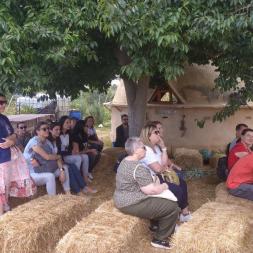
Environmental education: sustainable strategies to teach in the world of tomorrow
Transform your school's organic waste into thriving learning gardens and resources!! Join us in sunny Valencia, Spain, and discover the practical secrets behind our successful environmental education projects,” Green Inclusion”, "G3" and "Albal Circular." This hands-on course will empower you to implement and adapt proven soil regeneration techniques, creating enriching educational experiences for
Description
As teachers and educators, you shape the next generation's relationship with nature. We'll show you how transforming school organic waste, like cafeteria scraps, regenerates soil, combats climate change, and fosters community belonging.
This course reveals how introducing students to this ecological practice enhances their understanding of vital cycles: organic matter, water, and carbon. These cycles maintain Earth's ecosystem health.
Our approach provides adaptable teaching practices for all ages. You'll learn eco-techniques to create impactful learning environments.
We'll guide you in setting up school gardens and implementing regenerative agriculture. Learn practical, hands-on methods for soil regeneration, biodiversity, growing healthy food, composting, and more.
Integrating this into your curriculum fosters a deep connection with nature. Students will understand their environmental responsibility as conscientious citizens.
Learning objectives
This program aims to empower educators across all levels to integrate transformative environmental education into their settings. Through practical experiences, theoretical understanding, and community building, we will explore regenerative practices and create a network of passionate educators.
Practical Skills:
-Try out a range of eco-techniques to transfer to schools and educational settings.
- Learn about different ways of organic waste management in schools, educational settings, and communities.
- -Provide practical experiences, activities, and tools to educators to promote reflection and inspiration among participants.
- -Help educators plan how to create regenerative ecosystems in their schools or educational settings and plan realistic steps for implementation and success.
- -Learn to use soil regeneration projects as a community building, to develop teamwork and a shared sense of purpose among students.
- -Explore how parents and the local community can be involved in their children’s education through regenerative practises and workshop events.
Theoretical Understanding:
- -Offer a fresh and forward-thinking approach to integrating environmental education across various educational levels, including preschool, primary, secondary, and non-formal education.
- -Show educators real examples of how our projects are working in local schools and communities.
- -Understand that organic waste is a valuable resource for soil regeneration.
- -Explore how to integrate regenerative agriculture concepts into the school curriculum.
- -Raise ecosystem awareness by demonstrating how composting directly benefits local ecosystems and promotes biodiversity.
- -Understand the relationship of natural cycles and processes, such as the organic matter cycle, that occur in our ecosystems, and our interdependence with them.
- -Encourage sustainable practices at schools, educational settings and communities. ---.Adopting and promoting practices that minimize negative environmental impacts and support ecosystem health.
Community Building and Networking:
- -To have fun and to share successful creative activities they use in their school and country so we can learn from each other.
- -Create a network of educators, schools and educational settings from all over Europe.
Methodology & assessment
We foster a positive, relaxed, and supportive learning environment, where the exchange of participant experiences is integral to the learning process. The course strikes a balance between indoor sessions and outdoor explorations.
Our methodology focuses on the study and practical solutions to local environmental challenges, such as organic waste management or biodiversity improvement. By addressing these issues, we aim to adjust our actions and habits, fostering a deep sense of connection to our environment.
This experience will empower teachers and educators to implement learned practices in their classrooms, promoting sustainability and cultivating a strong sense of
Materials, digital tools & other learning resources
Different materials and other learning resources.
Certification details
The participants will receive the certificates at the end of the course:
- Certificate of attendance
- Learning agreement complement
- Support with the Europass mobility document – to be issued by the applicant’s National Agency
Pricing, packages and other information
-
Price:620Euro
-
Course package content:
Transport
-
Additional information:Description of the services and activities included in the course package (such as accommodation, meals, transport) or available at extra cost.
-
Cancellation & changes:
Info in our policy
-
Additional information:The options and conditions for change and cancellation, and the policy in case of unforeseen circumstances (force majeure).
Additional information
-
Language:English
-
Target audience ISCED:Primary education (ISCED 1)Lower secondary education (ISCED 2)Upper secondary education (ISCED 3)
-
Target audience type:TeacherStudent TeacherTeacher Educator
-
Learning time:15-20 hours

